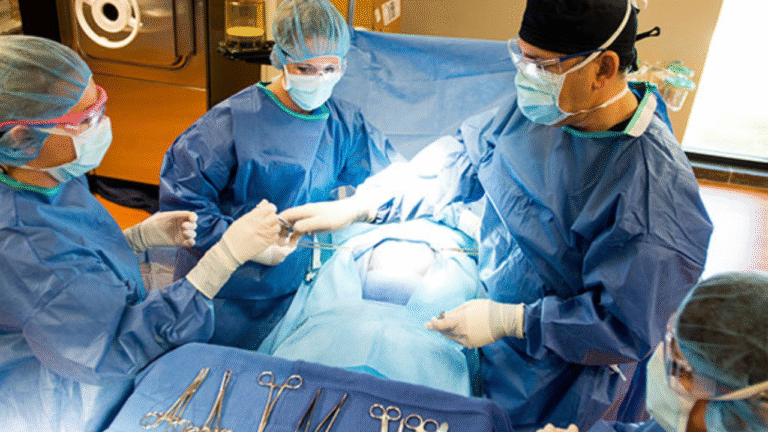So you’ve heard about surgical tech jobs and you’re wondering—is this the right gig for me? Maybe you’re into medicine but don’t want to spend a decade in med school. Or maybe you just love high-stakes, fast-paced work where what you do literally saves lives.
Well, guess what? You’re in the right place. In this guide, we’re diving deep into the world of surgical technologists—what they do, how to become one, what it pays, and if this life in scrubs is the one for you.
What is a Surgical Tech, Anyway?
Surgical technologists, sometimes called scrub techs, are the behind-the-scenes heroes in the operating room. They’re the ones prepping instruments, setting up sterile fields, and handing tools to the surgeon like a pro.
No, they’re not doctors—but they’re vital to making sure surgeries go off without a hitch.
Why Surgical Tech Jobs Are in Demand
Growing Healthcare Needs
The healthcare industry is booming—thanks to an aging population and constant medical advancements. That means more surgeries. And more surgeries = more surgical techs needed.
Rise in Surgeries & Medical Technology
With outpatient procedures on the rise and new surgical tools being invented almost daily, the demand for skilled surgical techs is at an all-time high.
Day in the Life of a Surgical Tech
Curious what it’s really like on the job?
Prepping the Operating Room
Before the patient even rolls in, surgical techs are setting the scene. They’re arranging instruments, double-checking equipment, and ensuring everything is sterile.
Supporting the Surgeon During Procedures
During surgery, surgical techs assist by passing tools, holding retractors, and even cutting sutures. You’re basically the surgeon’s right hand.
Post-Op Duties & Clean-up
Once the surgery wraps, it’s your job to count tools, help clean up, and prep for the next case. It’s not glamorous, but it’s crucial.
Must-Have Skills for Surgical Technicians
Tech-Savviness and Attention to Detail
Surgical tools and tech aren’t exactly simple. You’ll need to know your way around them—and be precise every single time.
Team Player Mentality
You’re part of a team that includes surgeons, nurses, and anesthesiologists. Collaboration is key.
Staying Cool Under Pressure
When lives are on the line, there’s no room for panic. Surgical techs need nerves of steel.
Surgical Tech Education & Certification
Where to Study: Programs & Schools
Most surgical techs start with a diploma, certificate, or associate degree from an accredited program. Community colleges and vocational schools are great places to start.
Getting Certified: What You Need to Know
Popular Certification Bodies
The two most recognized certifications are:
-
Certified Surgical Technologist (CST) via NBSTSA
-
Tech in Surgery-Certified (TS-C) via NCCT
How Long Does It Take?
Most programs take 12–24 months. Not bad for a career that puts you right in the OR!
Different Types of Surgical Tech Jobs
Hospital-Based Surgical Techs
The most common role. You’ll work shifts in hospital ORs, possibly covering emergencies and weekend surgeries.
Traveling Surgical Techs
Love to explore? Traveling techs work short-term contracts across the country. It’s great for adventure—and the pay’s often better!
Specialty Surgical Techs
Focus on one type of surgery—like orthopedics or cardiovascular—and become a master of that field.
Top Places Hiring Surgical Techs Right Now
States with High Demand
California, Texas, Florida, and New York are always on the lookout for techs. Population + hospitals = job goldmine.
Cities That Pay the Most
Want to follow the money? Try San Francisco, Boston, or Seattle. Just be ready for the cost of living!
Surgical Tech Salary Expectations
Entry-Level vs. Experienced Techs
Starting out, you might make around $40K–$50K a year. But with experience? Expect $60K+, especially if you specialize.
Benefits Beyond the Paycheck
Don’t forget about health insurance, retirement plans, overtime, and job security. It’s not just about the salary.
Work-Life Balance in Surgical Tech Careers
It’s a shift-based job, which means you can often avoid the 9-to-5 grind. But expect early mornings, long surgeries, and occasional weekends.
The upside? When you’re off the clock, you’re off. No homework or patient charts to review.
Pros and Cons of Becoming a Surgical Tech
Pros:
-
Quick path to a solid career
-
Exciting, dynamic work environment
-
High job satisfaction
Cons:
-
Physically demanding
-
High-pressure situations
-
Long hours on your feet
How to Land Your First Surgical Tech Job
Resume Tips for Techs
Tailor it! Highlight clinical rotations, certifications, and any hospital volunteer work. Action verbs are your friend.
Crushing the Interview
Be ready to talk about sterile techniques, handling emergencies, and teamwork. Bonus: Know a bit about the hospital you’re applying to.
Career Growth & Opportunities
From Tech to First Assist
Want to level up? With more training, you could become a Surgical First Assistant—basically the surgeon’s #1 support.
Branching Into Education or Management
Love mentoring? Teach future techs. More into leadership? Step into an OR manager or coordinator role.
Final Thoughts: Is Surgical Tech Right for You?
If you’ve got a steady hand, a sharp mind, and a passion for helping others—surgical tech jobs could be your calling. It’s not just a career. It’s a front-row seat to life-saving moments every single day.
FAQs
1. Do I need a degree to become a surgical tech?
Nope! Many programs offer diplomas or certificates, but an associate degree can give you an edge.
2. Is the job stressful?
It can be! You’re in high-stakes situations. But if you thrive under pressure, it’s incredibly rewarding.
3. Can surgical techs specialize?
Absolutely. Many techs focus on a specific area like neurosurgery or orthopedics.
4. Are there remote surgical tech jobs?
Not really. You need to be physically present in the OR. But travel positions offer flexibility.
5. How do I move up in this career?
Gain experience, get advanced certifications, or train to become a First Assist or OR manager.

